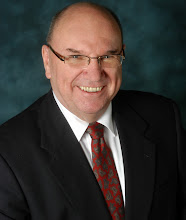Proposal writing is not an academic assignment.
Please don't make the same mistake many people make when writing a proposal.
In college, you write one way; in business, you write an entirely different way.
With your proposals, think BTB - business to business. That means person to person, not student to academician.
For example, you would (or should) never use a word like academician in personal or business writing. You may in college. But I recommend you avoid it in any document that pertains to business.
Your proposal writing should sound as natural as a telephone conversation. After all, that's all your proposal is - a written version of a conversation you would have with a client about solving the client's problem or making your client's life and bottom line better.
Let me give you an example.
Simply stated, we all grew up with the impression that a superior vocabulary is the mark of a superior mind.
So, when we wrote our term papers, we filled them with polysyllabic words to impress our teachers.
We used consultant words like utilize, paradigm, reiterate, conundrum, and transpire.
We also slipped in a few academic words like methodologies, cohorts, iterations, and monographs.
Consultant and academic words slow down your readers' brains as they try to interpret what you mean or how you are using those words.
Please allow me to comment on a few of those words to clearly explain not only the what I mean by conversational, but the why.
Let's start with "utilize."
The words "use" and "utilize" do not mean the same thing. Don't use the big word, "utilize," when a clearer, shorter, more understandable word will work. Most of the time when people use the word "utilize," they really should use "use."
Besides, you save time typing three letters (use) rather than seven (utilize).
Using three letters rather than seven allows your readers to read your document easier and faster. Direct them to focus on the benefits you bring to them, not your vocabulary.
A "paradigm" is a pattern, model, or example by which you are supposed to learn something about the structure of the English language.
Although "paradigm" has been popularized by consultants, many people still do not have a clear picture of what the word means. If you ask 10 people to define a paradigm, you will get 10 different definitions.
Be yourself and don't try to imitate someone else's words or style.
"Conundrum" is the corporate word for this decade.
Consultants use this word to imply a problem, challenge, or situation.
If you look up the word conundrum in a good dictionary (not a Pocket Dictionary) you find that a "conundrum" is a mythical or mystical puzzle or riddle, the answer to, which is a pun.
How many people do you think really know that?
Most people use the word "reiterate" to mean to restate, repeat, or emphasize.
If you mean restate, say restate.
The word "reiterate" means to "say repeatedly."
Most people use the word "reiterate" when they really mean to use "iterate" which means "to say or do again."
Actually, they should be using the words, state, restate, repeat, or emphasize, depending on what they are trying to say.
The dictionary tells us that the word "transpire" is considered incorrect or vulgar. Rather than telling you the actual meaning, I recommend you look it up in the dictionary.
But, you might say, "Looking up a word in the dictionary wastes my time."
Now you understand why you should use the shorter, more familiar, more easily understandable words when you write.
Most of the time when people use the word, "methodologies," they mean "methods" or "ways."
I once asked five academics what a "cohort" was. I got five different definitions.
Let's compare the language of two sentences that should say the same thing.
"I must reiterate that nothing will transpire until we utilize our resources to shift our paradigms as a means of addressing the conundrum we face." (25 long, confusing, abstract words)
If you were talking on the telephone, you would probably say:
"I must emphasize that unless we find a new way to refine crude oil, we will face gas shortages." (19 clear, familiar, easily understandable words)
So, my Proposal Writing message here is twofold.
1. Using conversational language increases the chances that your clients will clearly understand and quickly read every word you've written. You will not lose business because your client interpreted one of your big words or phrases differently than you meant it. Or, you will not force them to take more time reading your proposal.
2. Imagine you are the one reading the proposals. Would you prefer to read a clear, understandable, client focused proposal in five minutes or a confusing, erudite opus that took you 10 minutes to read?
What is your mental attitude and inclination after reading a five-minute proposal, versus a 10 minute proposed?
Friday, October 17, 2008
Proposal Writing Tip: Keep it Conversational
Subscribe to:
Post Comments (Atom)

No comments:
Post a Comment